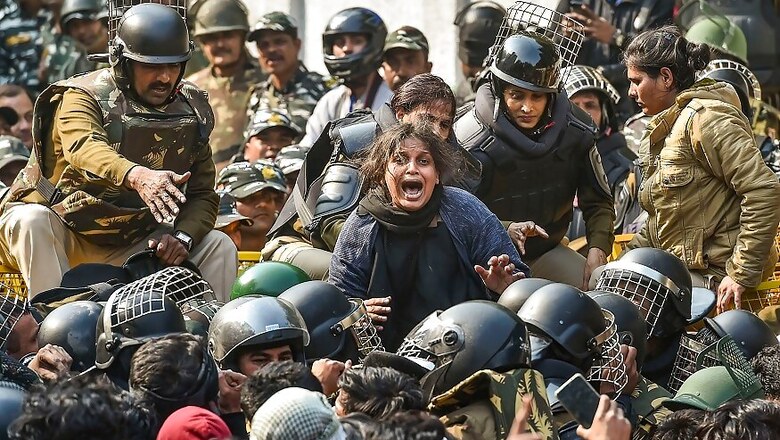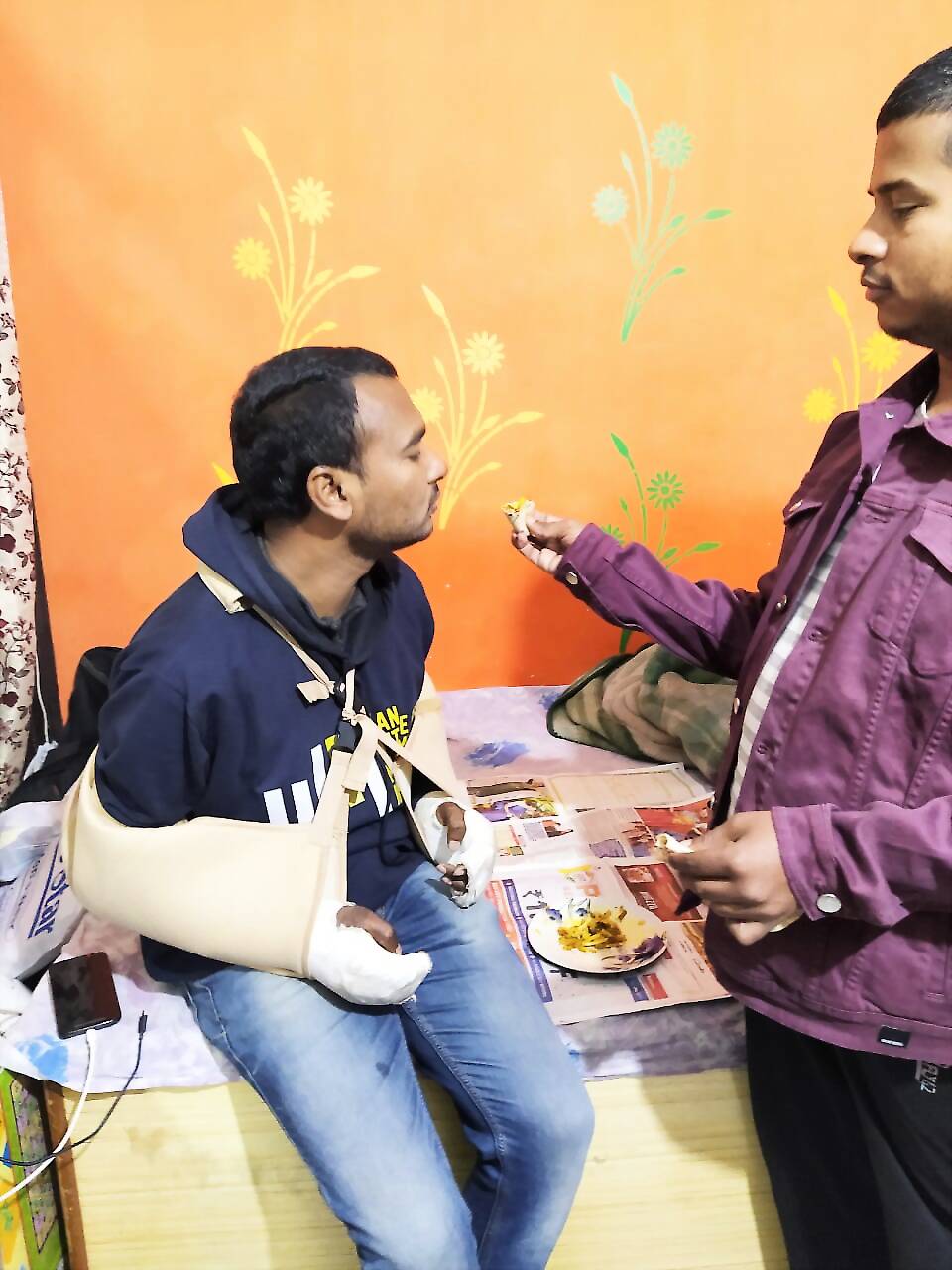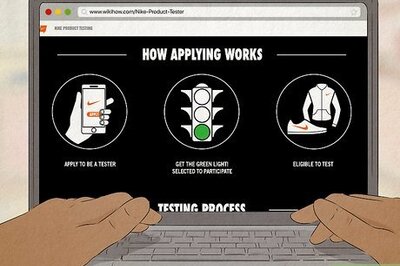
views
New Delhi: It has been over four months but Mustafa, 27, says he can still hear the sound of glass breaking and the smell of tear gas mixed with fear as he and about 25 students crouched inside the "Old Library" in Jamia Millia Islamia on the evening of December 15, hoping they were safe inside the closed doors.
In just a few minutes, however, men in police uniforms and riot gear would come and break down the door and mercilessly beat the students with batons before arresting some of them, he recalls.
Students had been studying in the library. Some were there to avoid the chaos outside. Many like Mustafa — who dreamed of becoming a public servant and was in the library preparing for the UPSC examinations — had nothing to do with the anti-Citizenship Amendment Act (CAA) protests that had been raging through the capital as well as the rest of India in December, of which Jamia emerged as an epicentre.
But the Bihar resident's plans were put on hold after Delhi Police decided to raid the premises of the prestigious university in Delhi and brutally beat up students in the name of law, he says.
After the attack, Mustafa ended up with two broken hands and a cracked skull, but he insisted that what hurt more was the apathy and sheer lack of accountability showed by everyone — the Jamia administration, the police, the state and central government — in redressing the police brutality. Or even addressing it.
Now, after over three months of silence and no inquiry or action against the perpetrators of the violence, some professors from Jamia have released a detailed report that clarifies the chronology of events that occurred from December 10 onward (the day Jamia students first started protesting against CAA), a day before the contentious Citizenship Amendment Act (2019) was passed by the Indian government under Prime Minister Narendra Modi. Titled "Night of the Broken Glass", the report is made up of correlated testimonies of students and others who allegedly faced brutality and abuse at the hands of Delhi Police personnel on the night of December 15.Chronology
December 2019 had been a month of demonstrations, especially in Delhi which saw a number of citizens take to the streets for days on end in various parts to protests against the CAA, as well as the implementation of the nationwide National Register of Citizens (NRC) and National Population Register (NPR). Critics slammed the laws as anti-minority and wanted the Bharatiya Janata Party-led government to take back CAA. What started s peaceful protests, however, soon turned violent as cops and protesters clashed at various locations including Jamia.
On December 15, a student-led protest had been planned to commence from Jamia to Rajghat. According to students and teachers, the march had tried to take place in the preceding two days as well but police did not allow it. Meanwhile, violence broke out in other parts of Delhi including the nearby Jamia Nagar where two buses were set on fire. Students from Jamia were blamed for the protests (though both college administration and students denied any part in it and the police could conjure no evidence to prove the same). There was also violence in New Friends Colony, another neighbouring South Delhi locality.
At around 6 pm the same evening, police entered the premises of Jamia."Kristallnacht"
"I was returning from Maghrib Namaz when I felt tension increasing outside Jamia. There were a lot of cops and CRPF forces crowding the gates. I quickly rushed to the Old Library in Ibn Sina Block and went to the library. Many of us did, because we thought we would be safe there," Md Minhajuddin, 26 and final year student of LLB, told News18.
After the police broke down the doors and entered the library, they started to indiscriminately beat up students, Minhajuddin said. One of the cops hit him on the head with a stick. After that, all went dark.
"They injured my head and eye with the butt of the lathi. I was bleeding profusely. After the cops left with some students, I managed to escape to the bathroom where I collapsed," he said. Minhajuddin bled on the bathroom floor for at least 40 minutes before a few students found him and arranged for an ambulance to take him to Al Shifa hospital. But upon reaching, doctors refused to treat him.
"They had busted my eye. Doctors wouldn't touch it. I had put a bandage on the eye to stop the bleeding. No one would even peek under the bandage and look," he recalled.
Minhajuddin was later taken to AIIMS where doctors told him his cornea was completely damaged along with some vital nerves that would make even an eye transplant impossible. Minhajuddin, who hails from Samastipur in Bihar and came to Delhi with dreams of becoming a lawyer, is now blind in one eye.
The student claims that though he has filed an application for compensation with Jamia, the attitude of the administration has been lax at best. The student, whose testimony is part of the collection published in "The Night of the Broken Glass" report, said he had never thought that something like this would happen inside the university, which he had considered a safe space, almost a second home.
Mustafa and two others had been arrested from the Old Library and taken to New Friends Colony police station after being beaten. A total of 16 people including Jamia students were detained in the station. According to the report, the detainees, many of whom were injured, were given no medical aid or food untill 6 am the next morning when they were released.
Mustafa alleged that the reception staff at AIIMS refused to file Delhi Police as the perpetrators of violence in the medico-legal certificate (MLC) made for him. "They wrote 'unidentified' persons from Jamia; that is clear violation of medical ethics," he said. He also alleged that at the station, police used communal profanities against the detained students, most of whom were Muslims. "They mocked us with slogans of 'azadi' and asked us to read the 'Qualma' which in Islam is often read at the time of death."Lack of documentation
Mira Sethi, one of the authors of the report, told News18 that the reason she and some other teachers who wished to remain anonymous chose to document the testimonies was to have a valid documentation of the chain of events.
Then a professor at Jamia, Sethi was present on campus when the police raided it on December 15. She had gone to get her car which had been parked inside the premises.
"Media reports at the time were muddled and many were biased one way or another. There is no clear documentation of the level of brutality unleashed by those meant to uphold the law on innocent, unarmed students," she said.
"The police version is that cops raided the campus in pursuit of rioters from outside. But when I reached Holy Family (Hospital), I found battalions entering the college not in pursuit of outsiders but with the intention of raiding it," Sethi said. She and several others claimed Delhi Police broke CCTV cameras at strategic locations before and during the raid.
The report details the testimonies of about 20 victims including students and some non-students who were injured during the raid in and around Jamia. It also includes the experiences of security guards posted at Jamia as well as doctors in Al Shifa and Holy Family hospital.
The report, whose name is a reference to "Kristallnacht" or the November Pogrom (November 9-10, 1938) against Jews in Nazi Germany, coincided with the ongoing outrage after Jammu and Kashmir Police slapped the oft-termed "draconian" Unlawful Activities (Prevention) Act against Kashmiri journalists Masrat Zahra and Peerzada Ashiq.
The Night of The Broken Glass: Testimonies from Jamia Millia Islamia students Report on Police Violence On Campus on 15th Dec 2019 REPORT LINK : https://t.co/08JMWQWyRn@India_Resists pic.twitter.com/DyHdMUlS66 — CampaignAgainstWitchHunt (@EImpunity) April 24, 2020
"This is clearly a witch-hunt. First the police attacks, then UAPA is slapped on protesters," a student who wished to remain anonymous said. According to Sethi, the report is an attempt to shed light on the "witch hunt".
"The state has mobilised the most draconian law at its disposal to criminalise a democratic protest and to efface the role of sundry right-wing leaders who have been instigating violence ever since the anti-CAA protests began. The case will fall eventually as do over 75 per cent of UAPA cases but, in the meantime, the process of law will be the punishment for these young people who came out to defend the Constitution," Sethi, who recently moved to teach at NALSAR this year, told News18.Plans on Hold
Mustafa, who lost the use of both hands for about 45 days after cops broke two of his metacarpals in one hand each, said he was waiting for the coronavirus pandemic to be over. He had filed a petition in the Supreme Court against the police's refusal to file an FIR for the attack on him as well as in High Court for compensation. "The High Court one was in April but now due to the lockdown, it will probably be rescheduled," the UPSC aspirant said.

Mustafa, whose father passed away when he was in Class 10, said that it pained him that despite being someone who had never had anything to do with politics or protests, he was beaten up. His laptop was also broken. "My hands will work fine in time," he said.
The student feared that with the state and police's failure to redress the violence and violation of the rights and safety of students, the rot that is in this system may continue to alienate people like him who have the potential and passion to work for the nation but are instead left disabled by authoritarian brutality.




















Comments
0 comment